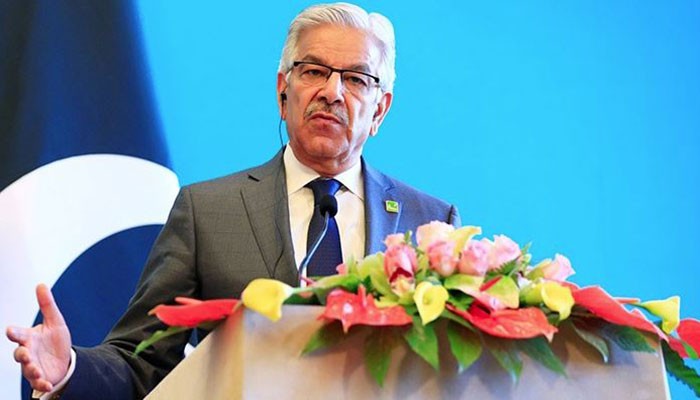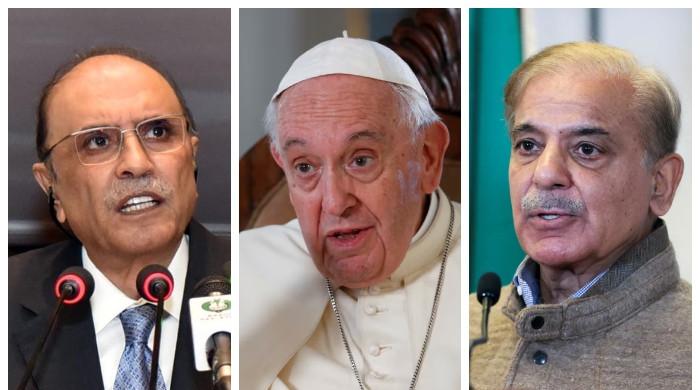Political forces expected to settle grievances in political forums: IHC
Three-member bench says when political matters are decided in court it has consequences not only for the institutions but the litigant public as well
April 26, 2018

ISLAMABAD: A three-member bench of the Islamabad High Court (IHC) which disqualified Foreign Minister Khawaja Asif on Thursday observed in its judgment that political forces should settle their grievances in political forums.
“However, when political forces, instead of settling disputes at the political forums, particularly the Majlis-e-Shoora (Parliament) resort to the courts, it has consequences not only for the institutions but the litigant public as well,” the concluding statements of the judgment read.
“This conduct of political forces lowers public confidence in the Legislature on the one hand and on the other hand exposes the institution of the judiciary to the controversies of adversarial politics. The political forces are expected to settle their grievances before the political forums rather than taking the precious time of the bona fide litigants awaiting justice to be dispensed,” the judges added.
The three-judge bench headed by Justice Athar Minallah ruled that Foreign Minister Khawaja Asif stands disqualified from Parliament for holding an Iqama (work permit) of the United Arab Emirates.
The petition was filed by Pakistan Tehreek-e-Insaf (PTI) leader Usman Dar who was defeated by Asif in the NA-110 constituency of Sialkot in the 2013 general elections by around 20,000 votes.
Stating that it would have “been appropriate if the political party to which the petitioner belongs had raised the issue at hand in the Parliament before invoking the jurisdiction of this court”, the judgment read, “Parliament is a symbol of unity of the Federation and the peoples will. Parliament deserves utmost respect and its prestige and public confidence depends on the conduct of its members who represent the actual stakeholders ie the people of Pakistan. It would have been appropriate if the political party to which the Petitioner belongs had raised the issue at hand in the Parliament before invoking the jurisdiction of this court.”
“It is ironic that Pakistan is amongst the few countries where a formal code of ethics and conduct for members of the Majlis-e-Shoora (Parliament) and the Cabinet has not been prescribed so as to avoid situations such as have been observed in the facts and circumstances of the instant petition.”
“We have handed down this judgment with a heavy heart not only because a seasoned and accomplished political figure stands disqualified but more so because the dreams and aspirations of 342,125 registered voters have suffered a setback,” the bench said in its concluding statement on the judgment disqualifying the Pakistan Muslim League-Nawaz (PML-N) stalwart.
The three bench members unanimously ruled that Asif was not qualified to contest the 2013 general election from NA-110 as he did not fulfil the conditions described under Article 62(1)(f) of the Constitution, read with Section 99(1)(f) of the Representation of People Act 1976.
According to judgement it was “obvious from the facts and circumstances in the instant case that the Respondent (Khawaja Asif) had deliberately and willfully not disclosed his status as an employee of the Company, nor receiving of the salary per month pursuant thereto, despite having been expressly put to challenge by other contesting candidates.”
"The validity of 'Iqama', working as an employee of the Company and receiving a substantial salary without being physically present, which is AED 50,000/- per month under the Third Contract executed in July 2017, were some benefits gained from non-disclosure. Disclosure would have led to giving up the 'Iqama' and the hefty salary paid by the Company for some advice sought telephonically by a foreign-based employer from the prospective Defense and then Foreign Minister of Pakistan. We have deeply pondered but could not persuade ourselves that this deliberate and willful non-disclosure was a bonafide or honest omission."
"The lack of honesty was established by not disclosing the employment as an occupation and the salary received per month despite the vague and obscure amount declared as foreign remittances having been specifically challenged. This would also apply to the non-disclosure of the account maintained with the Bank of Abu Dhabi. Nothing has been placed on record to show that a request had been made for closing the account before submitting the nomination paper."














